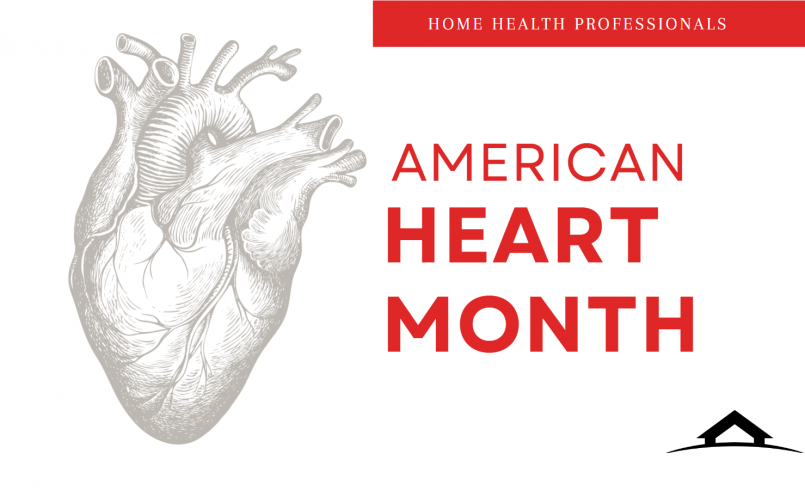
American Heart Month
The month of February is American Heart Month. This month we highlight the importance of heart health and how to maintain a healthy heart. When heart awareness month comes around, there are tons of words or phrases that are frequently used. This month we will break down the terminology, explain different types of heart conditions, and provide you with tips to help you take care of your ticker.
Breaking Down Terminology
Part of effective treatment is understanding what heart health is to make practical life changes. Below you will find a number of terms and their meanings, to help you learn more about your heart health. Take a look at some of the most commonly used terms that you will face when discussing heart health with your physician.
Heart health is the overall well-being of your heart. This means you learn your potential risk factors, make healthy choices, and take steps to reduce your chances of getting heart disease.
Heart disease is an umbrella phrase describing all ailments that could affect the heart’s structure and functions.
Cardiovascular disease is the term for all diseases that affect the heart or blood vessels.
Blood pressure is the force of blood pushing against the walls of your arteries as your heart pumps blood. A healthy reading for blood pressure is less than 120/80mm Hg. High blood pressure occurs when blood pressure is consistently 130/80mm Hg.
Cholesterol is a waxy, fat-like substance in your cells. Cholesterol helps make hormones, vitamin D, and substances to help you digest food. Keep in mind that cholesterol can be divided into three different classes; High-Density Lipoprotein (HDL), Low-Density Lipoprotein, and Triglycerides. HDL is the “good” cholesterol that helps to move cholesterol so blockages don’t build up. HDL keeps your arteries free and clear. LDL is “bad” cholesterol that deposits cholesterol in your blood cells which then carry blood to your heart and other organs. Over time, LDL may cause your arteries to narrow and be blocked. Triglycerides are a type of fat that can be used for energy. If you have high triglyceride levels and low HDL levels this can increase your chances of heart attack and stroke.
Did you know being overweight or obese can increase LDL and lower HDL?
Heart Conditions
Now that we have a general understanding of some commonly used heart-associated terminology, we can move on to the different types of heart conditions that can affect you.
Cardiovascular Disease
Cardiovascular Disease Is an umbrella term for all the different types of diseases that affect the heart, arteries, and/or blood vessels.
Coronary Heart Disease
Coronary heart disease can also be referred to as heart disease or coronary artery disease. Coronary heart disease occurs when plaque builds up in arteries, this can be called atherosclerosis. When the plaque builds up, the amount of oxygen-rich blood going to your heart is greatly reduced. This can cause chest pain and can lead to blood clots, which also block blood flow, leading to a potential heart attack.
Heart Disease
The term heart disease describes a large variety of conditions that affect the heart’s structure and function. Heart diseases are cardiovascular but not all cardiovascular diseases are heart diseases. Oftentimes heart disease is a reference to coronary heart disease.
From overarching terminology to more precise verbiage, it’s important to understand what is affecting you or your loved one. Be sure to ask your doctor for clarity when they are informing you of your ailment. Understanding your health is so important in the diagnosis, treatment, and recovery process. So, don’t be shy about asking those questions!
Keeping Your Ticker Ticking
The term “self-care” has been thrown around so frequently lately. Simply put, self-care is what you do to stay healthy. We have a couple of tips for you when it comes to keeping your heart healthy. Check them out here:
- Get a daily dose of activity. Taking a 30-minute walk that raises your heart rate can help you manage stress, lose weight, and keep your heart pumping.
- Cook meals that are low in sodium and unhealthy fats.
- Get 7 to 8 hours of sleep every night.
- Reach for healthy snacks like fruits and veggies.
- Play with the children in your life. You’re never too old to play outside!
- Involve a friend or family member. Sometimes it’s hard to do things alone. Ask someone to join you.
It’s time to prioritize yourself, your health, your family, and even your community. If you or someone you love is suffering from a cardiovascular disease, be sure to take some time to educate yourself about the disease. You may not be able to control the disease itself but you can take steps to live a healthier lifestyle.
At Home Health Professionals our cardiopulmonary program aims to improve your quality of life and reduce hospitalizations by focusing on patient education, disease management, and much more. Let our skilled nurses and therapists assist you on your road to recovery. If you’d like to learn more about heart disease check out our Programs page on our webpage!
You must be logged in to post a comment.